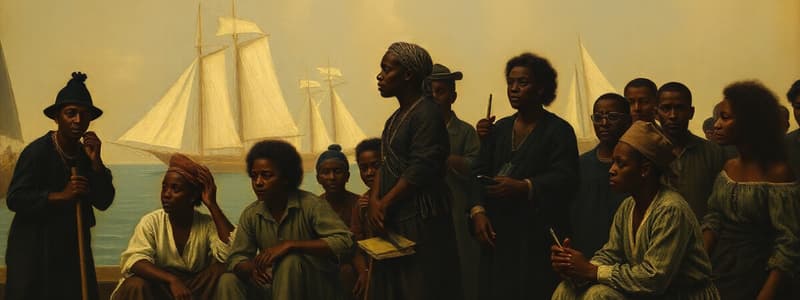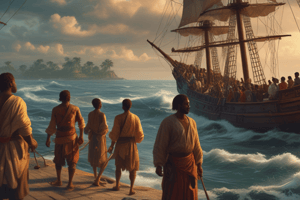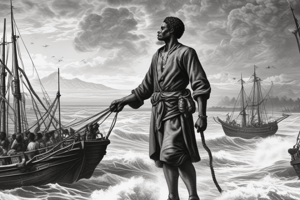Podcast
Questions and Answers
What was one significant impact of the Atlantic Slave Trade on the labor supply in the Americas?
What was one significant impact of the Atlantic Slave Trade on the labor supply in the Americas?
- It caused a shift towards mechanized farming.
- It decreased the population of Native Americans.
- It resulted in the establishment of sugar and tobacco plantations. (correct)
- It increased the reliance on indentured servants.
What was one of the main reasons European owners preferred enslaving Africans over Native Americans?
What was one of the main reasons European owners preferred enslaving Africans over Native Americans?
- Africans had more experience in farming.
- Africans were easier to control through fear.
- Africans were more resistant to European diseases. (correct)
- Native Americans were too expensive to maintain.
Which factor contributed to the profitability of sugar and tobacco plantations during the Atlantic Slave Trade?
Which factor contributed to the profitability of sugar and tobacco plantations during the Atlantic Slave Trade?
- The decline in European agricultural production.
- The integration of enslaved laborers into the workforce. (correct)
- The use of advanced technology for farming.
- The increase in domestic consumption of sugar.
What led to the decrease in Native American populations as a labor source?
What led to the decrease in Native American populations as a labor source?
In the context of the Atlantic Slave Trade, which statement accurately describes its demographic impact?
In the context of the Atlantic Slave Trade, which statement accurately describes its demographic impact?
What demographic shift occurred due to the demand for cheap labor in the European colonies?
What demographic shift occurred due to the demand for cheap labor in the European colonies?
Which region’s colonies were particularly involved in the transition to slavery from Native American labor?
Which region’s colonies were particularly involved in the transition to slavery from Native American labor?
What was one of the major consequences of the slave trade in the Americas?
What was one of the major consequences of the slave trade in the Americas?
By which century were European powers increasingly turning to Africa for workers?
By which century were European powers increasingly turning to Africa for workers?
In terms of European colonial practices, what was a primary motivator behind the use of African slaves?
In terms of European colonial practices, what was a primary motivator behind the use of African slaves?
What aspect of slavery in the Americas was heavily characterized by brutality?
What aspect of slavery in the Americas was heavily characterized by brutality?
Which of the following best describes the relationship between the Europeans and the Native Americans before the shift to African slavery?
Which of the following best describes the relationship between the Europeans and the Native Americans before the shift to African slavery?
Which statement best describes the role of slaves in Muslim societies?
Which statement best describes the role of slaves in Muslim societies?
What was the initial reason for the demand for African slaves by Portuguese traders in the 1400s?
What was the initial reason for the demand for African slaves by Portuguese traders in the 1400s?
How many Africans were transported to the Muslim world during the historical period mentioned?
How many Africans were transported to the Muslim world during the historical period mentioned?
What distinguishes the treatment of slaves in African societies from that in other regions?
What distinguishes the treatment of slaves in African societies from that in other regions?
What misconception might one have about the nature of slavery in the Muslim world?
What misconception might one have about the nature of slavery in the Muslim world?
What was one way rulers in Africa justified enslavement during the spread of Islam?
What was one way rulers in Africa justified enslavement during the spread of Islam?
How long had slavery existed in Africa before the increased slave trade in the seventh century?
How long had slavery existed in Africa before the increased slave trade in the seventh century?
What was one of the main effects of the spread of Islam into Africa?
What was one of the main effects of the spread of Islam into Africa?
What term is used to describe the economic system that benefitted from enslaved individuals on plantations?
What term is used to describe the economic system that benefitted from enslaved individuals on plantations?
Which of the following correctly characterizes the nature of slavery during the early spread of Islam in Africa?
Which of the following correctly characterizes the nature of slavery during the early spread of Islam in Africa?
What misconception might people have about the impact of slavery in early Africa?
What misconception might people have about the impact of slavery in early Africa?
In which historically significant century did the increase in the slave trade primarily occur?
In which historically significant century did the increase in the slave trade primarily occur?
What role did Islamic rulers play in the context of slavery?
What role did Islamic rulers play in the context of slavery?
What aspect of trade was affected by the enslavement practices justified by Islamic teachings?
What aspect of trade was affected by the enslavement practices justified by Islamic teachings?
How can the justification for enslavement by Islamic rulers be seen in a broader historical context?
How can the justification for enslavement by Islamic rulers be seen in a broader historical context?
Flashcards are hidden until you start studying
Study Notes
The Atlantic Slave Trade Overview
- The Atlantic Slave Trade was a brutal and significant part of America's population, involving the forced transportation of millions of enslaved Africans.
- European colonists in the Americas needed cheap labor for labor-intensive plantations, particularly for sugar and tobacco production.
Economic Motivations
- European plantation owners sought to maximize profits by enslaving Africans rather than relying on Native Americans, who were decimated by disease, warfare, and brutality.
- The demand for enslaved labor prompted Europeans to turn to Africa for a workforce.
Historical Context
- Slavery existed in Africa for centuries before European involvement, largely as a minor institution until the spread of Islam in the 7th century.
- Muslim traders justified enslavement under Islamic law, leading to significant slave transport beginning around 1500.
- Between 1500 and 1600, approximately 17 million Africans were transported through the Muslim slave trade to regions in Southwest Asia and North Africa.
Social Dynamics of Slavery
- In many African and Muslim societies, slaves could achieve some social mobility and had legal rights, unlike the conditions faced in the Americas.
- Some African slaves held influential roles, were able to marry, and could escape bondage.
European Involvement
- The Portuguese were the first European traders involved in the Atlantic Slave Trade, beginning their operations in the 1400s.
- Many enslaved Africans were transported to the Americas under horrifying conditions, particularly during the Middle Passage—a journey marked by extreme inhumane treatment.
Statistical Significance
- North America represented a small fraction, about 4%, of the total number of enslaved individuals transported across the Atlantic.
- The trade's demands and conditions laid the groundwork for extensive cultural interactions and demographic shifts in the Americas.
Personal Accounts
- Personal narratives, such as those from Olaudah Equiano, detail the inhumane experiences faced during transport from West Africa to the West Indies, illustrating the horrific realities of the Middle Passage where slaves were packed tightly into ship holds.
Studying That Suits You
Use AI to generate personalized quizzes and flashcards to suit your learning preferences.




